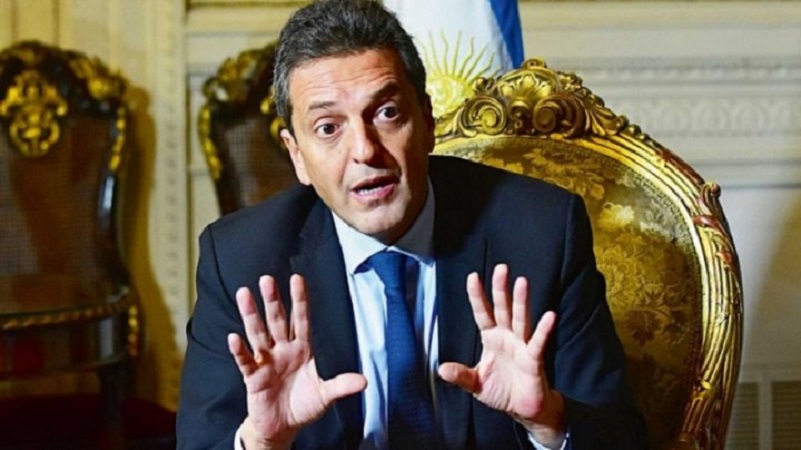
“The inflation data seems very bad to us, it was not what was expected” were the words of Gabriela Cerruti, the official spokesperson, after knowing the February data of 6.6% and exceeding three digits in one year. The statements of the official spokesperson are no longer surprising, it is the expression of a government that lost the war against inflation and whose measures (at the Fund’s request) push prices up. The other side is the continuous deterioration of wages. In 2022 the Minimum Vital and Mobile Wage lost 33% in relation to 2015, as calculated by the Research and Training Center (Cifra) of the Central de Trabajadores de Argentina (CTA). A credit that is a reference for the Potenciar Plans, which receive half of that remuneration. Last first?
Meanwhile, the Government managed to reach an agreement with the IMF on the fourth revision of the agreement, although the primary fiscal deficit target of 1.9% of GDP for this year, that is, Massa will have to cut even more. Due to the effect of the drought, the Fund decided to make the reserve goal more flexible, but the bleeding of dollars does not stop.
Massa will have to face these storm fronts in a context of global uncertainty due to the fall of the North American banks Silicon Valley Bank, Signature Bank, and in Europe Credit Suisse, which caused the declines in the European and United States stock markets.
In this critical situation, the Latin Focus Forecast report for March, a study that averages the projections of 45 consultancies and local and foreign financial entities, estimates that this year will close with a price increase of 98.7%. This percentage is four percentage points higher than inflation in 2022. Regarding economic activity, it is expected that the economy contracts 0.5% per year by 2023. A panorama that distances the possible candidacy of Massa.
reserve drain
The IMF agreed to modify the target for the accumulation of net international reserves for 2023. The dollars entered the coffers of the Central Bank, but left through another window. According to a Cifra report between 2020 and 2022, “the main components of the exchange balance that had a negative impact on reserves are debt payments, both principal and interest (-35,678 million, excluding that of the IMF and other organizations), the deficit tourism (-11,046 million) and freight within the framework of the growth of its international price (-8,635 million). To a lesser extent, capital flight accounted for 4,477 million dollars”. Argentina suffers recurrently from external restrictionsthat is, the chronic shortage of dollars to sustain economic growth and This is the product of structural causes such as the backwardness of the economic structure, capital flight, the dominance of large foreign companies that want to bring profits to their headquarters.
The drought impacts on the lower harvest and therefore on lower exports and collection from withholdings (so far this year, the rights fell 78.3% in February in real terms compared to the same month of 2022, according to OPC). The Buenos Aires Grain Exchange (BCBA) once again decreased soybean and corn production estimates for the 2022/23 campaign by 4 million tons (-14%), taking it from 29 to 25 million tons. The figure marks a collapse of 42% compared to the previous campaign (43.3 million tons).
According to Figure, in the first two months of 2023, international reserves fell by US$ 5,889 million. The weakness of the reserves raises the question of whether the government will be able to sustain the exchange rate and avoid a devaluation this year, which will overheat inflation.
The Fund targets retirements
In the Fondo’s recipe manual you will find the pension reform. That is why the pension moratorium approved in Congress fell like a bucket of cold water for the organization. Thus, in its official statement, it indicated that its approval was “unforeseen” and requires that “early and decisive measures be taken to sustainably address the fiscal costs” of its approval.
Before the moratorium is approved, the Fund technical document of the third review of the agreement warned that efforts should continue to contain retirements and “avoid moratoriums”as well as eliminate special regimes. In the same report, they estimated a drop of 0.2% of GDP in retirement spending for this year in relation to 2022. The Government promised to comply with this reduction through a greater cut in spending, focusing on social benefits, to meet the fiscal deficit goal of 1.9% GDP, despite the fact that the drought and lower exports reduce revenue.
The truth is that despite the IMF’s criticism, the Frente de Todos government has been doing its homework to cut pensions. The suspension of the pension update formula, and its subsequent replacement by a new one, aimed at reducing the weight of retirements and other items that are updated with that formula. According to a report from the Congressional Budget Office (OPC) Spending on retirements fell from 5.9% of GDP in 2019 to 5.5% in 2021. Kristalina Georgieva likes this.
And in that came the fall of Silicon Valley Bank
It rains it pours wet for Massa. Last week the fall of Silvergate, Silicon Valley Bank (SVB) and Signature Bank It impacted the local financial market with a drop in the Buenos Aires stock market and increased country risk. There are different positions on whether they are isolated cases or it is a systemic problem, the state response was to bail out capital. As the economic journalist Martín Wolf acknowledges in the Financial Times, “this is how, crisis after crisis, we have created a banking sector that is private in theory, but in practice is under the tutelage of the State. (…) The result is a system that is essential for the functioning of the market economy, but that does not abide by its rules. This is a disaster”.
For his part, Esteban Mercatante explains that “some of the “mismanagement” of SVB’s financial risk is much more widespread than might be suspected. Second, is that the Fed didn’t just fail on the control side as a result of laws that deliberately relaxed them; it also had an active role in the entire sequence that went from the fattening of assets in the hands of entities like this, to the more recent need to exert pressure with its monetary policy that is shaking the system like a house of cards”.
In this unstable panorama the question is How could it affect Argentina?. According to a report by the consulting firm Abeceb, the immediate impact of the crisis is that it “depresses the price of dollar bonds and increases country risk.”
According to the same consultant the Government may face greater complications to renew the debt in pesos. Meanwhile, Abeceb forecasts two scenarios, one where the Federal Reserve (FED) adjusts interest rates more moderately and the dollar weakens, improving the prices of commodities and the interest rate on the debt with the IMF is reduced; and another adverse scenario where the FED continues to increase rates and the dollar strengthens, which would cause a drop in the prices of the raw materials that we export “combined with higher external debt costs.”
The economy is navigating troubled waters, the departure of the government and the bosses’ opposition is to continue under the reign of the IMF, a path that will not bring anything good for the working class. Inflation, eternal debt, low wages, recession are the consequences of keeping the agreement. It is possible not to repeat again the history of dependency and backwardness to which the programs with the IMF lead: it is necessary to raise the sovereign disregard of debt based on popular mobilization.
Source: www.laizquierdadiario.com

